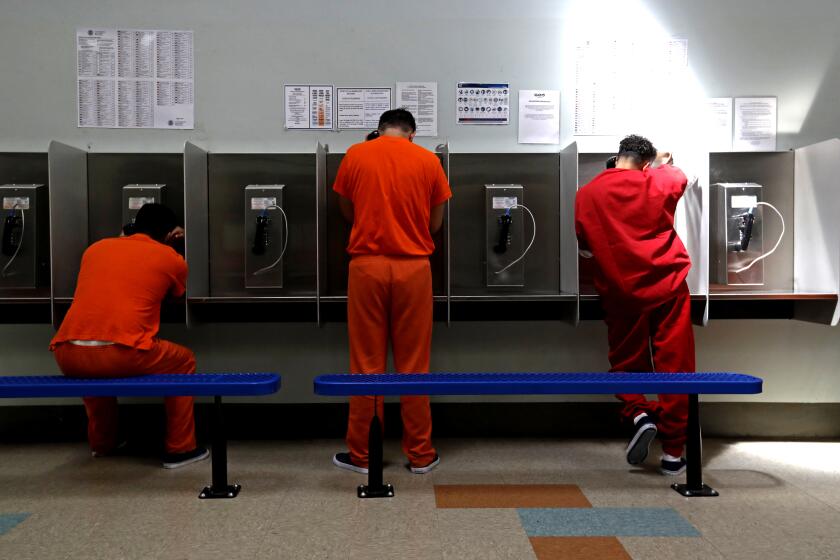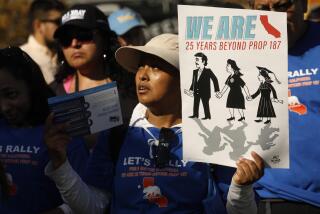Column: Want to stop immigration? Empower immigrants in the U.S. to help their families back home

- Share via
President Biden wants to slow migration to this country, a priority of his administration at the Summit of the Americas. It’s a bizarre venue to make such a stand, considering that the event is happening in Los Angeles, a crossroads of the Latino world.
The summit became a snub to Latinos the moment Biden prioritized Florida’s conservative Cuban Americans above other Latinos, such as Mexican Americans. This was the rationale behind barring Cuba, along with its perceived allies Nicaragua and Venezuela. The exclusion defied leaders such as Mexico’s President Andrés Manuel López Obrador, who decided to boycott this week’s event.
The gathering could have elevated the Latin American diaspora, who understand immigration’s root causes better than anyone. Instead, the immigrants working the summit, busing dignitaries’ tables and making their hotel beds, feel unheard.
Biden has used the summit to inhabit a self-defeating archetype: the compassionate nativist, as former President Obama did when quoting Scripture’s advice against oppressing the stranger even while setting records for deportations.
The compassionate nativist takes pains to distinguish himself from the sadistic one. He won’t insult the stranger. He’ll tell her not to come, sure, but he won’t call her names. He’ll stifle her movement by militarizing borders, but he’ll also boast of “aid” and private investments to address immigration’s supposed “root causes.”
He’s hypocritical and blind to history, which shows that investments in export-oriented industries, including some of those that Vice President Kamala Harris is encouraging in Central America, are primary drivers of displacement for Black and Indigenous people — concentrating wealth among local elites and foreign investors. Like the sadistic nativist, the compassionate one fails to slow immigration.
Opinion Columnist
Jean Guerrero
Jean Guerrero is the author, most recently, of “Hatemonger: Stephen Miller, Donald Trump and the White Nationalist Agenda.”
“They’re creating conditions for people to always leave their land,” said Miriam Miranda, a Honduran activist who advocates for her people, the Afro Indigenous Garífuna, to be able to live in Honduras without being killed or starving. “It’s true that we have the right to migrate, but we also have the right to stay. Why does nobody ever talk about the right we have to stay?”
For decades, the Garífuna in Honduras have been displaced by plantations growing African palms and other “development” projects that exploit natural resources and low-wage labor while extracting profits for wealthy countries. Many who resist are murdered. An organization in which Miranda is a leader, the Black Fraternal Organization of Honduras, counts at least 50 recent assassinations of Garífuna.
The extermination of people who resist multinational agribusiness, mining and other mega-projects is widespread in Central and South America — the deadliest regions for land defenders and human rights activists. They’re killed with U.S. guns smuggled south and by police and militaries trained and equipped by the U.S.
The poverty and violence motivating immigration are symptoms of decades of bipartisan U.S. support for governments and industries that exploit, expel and execute marginalized communities while pillaging their resources.
“It’s the economic model that has brought us climate change: more extraction, more production, more consumption for elites, and the poor are forced to pay the price,” Aviva Chomsky, the author of “Central America’s Forgotten History” and a history professor at Salem State University, told me.
The Buffalo gunman had ‘14’ written on his rifle. I know that white-supremacist slogan because of demonstrations in my town of Thousand Oaks.
It’s hard for some politicians here to understand how U.S. investments could be harmful because they see these countries as backward recipients of U.S. charity. But as the Uruguayan journalist Eduardo Galeano famously wrote in 1971: “Latin America is the region of open veins.” Much of the riches apparent in the United States come from the theft of not only Latin America’s crops and minerals but also its people, trafficked here to harvest crops and clean homes for dismal wages.
U.S. Latinos now represent the largest Spanish-speaking Latino economy in the Western Hemisphere, according to Raúl Hinojosa-Ojeda, founding director of UCLA’s North American Integration and Development Center.
The most marginalized U.S. Latinos — the 11 million undocumented, many of whom come from the poorest and most violence-plagued villages in Latin America — have untapped potential to protect relatives’ rights to stay home. That potential can be unlocked by giving them green cards, which would let them earn higher wages and thus, send greater remittances back to their origin countries.
Remittances, the money immigrants send loved ones at home, vastly exceed U.S. aid and represent an enormous share of the recipient nations’ GDPs. For example, the Biden administration pledged $4 billion over four years to Central America. Compare that with $11.4 billion in remittances received just by Guatemalans in 2020 alone. That’s equivalent to 15% of Guatemala’s GDP.
People in criminal court get public defenders. Those fighting deportation in immigration court need legal counsel too.
“The money is already going to the villages where the money is needed,” Hinojosa-Ojeda told me. Simple improvements to the remittance process would help many remain in their countries of origin. Problems arise because money is generally wired via Western Union for a fee, and must be withdrawn as cash. Often, undocumented senders and rural recipients don’t have bank accounts to facilitate saving. They must spend or hide the cash.
Hinojosa-Ojeda’s center is advising Harris, the U.S. Agency for International Development and Mexican leaders to support financial infrastructure that allows cross-border families to save money and removes remittance fees.
But a pathway to citizenship is crucial, too. It would dramatically boost immigrant earnings, while allowing them to visit loved ones south of the border — lessening the pressure for family reunification in the U.S.
Ultimately, the empowerment of immigrants within U.S. borders could prove to be the best way to empower poor relatives back home who might otherwise resort to migrating. As Hinojosa-Ojeda said of immigrant workers in the U.S.: “They’re dying to figure out a way to sustainably help their families and communities.”
It seems so obvious. But U.S. leaders of both political parties keep thinking of immigration only as a problem. What if immigrants are the solution?
More to Read
A cure for the common opinion
Get thought-provoking perspectives with our weekly newsletter.
You may occasionally receive promotional content from the Los Angeles Times.














